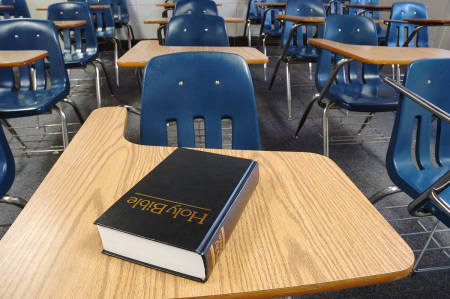Ohio school district drops off-campus Bible lesson program for students

A school district in Ohio has unanimously voted to rescind a policy that allowed around 300 children to receive Christian instruction off campus during school hours.
The Westerville City School Board voted 4-0 with one abstention at the Monday evening meeting to rescind the policy allowing for released-time instruction for public school students.
LifeWise Academy CEO Joel Penton, who spoke at the meeting in favor of the RTI program, said in a statement emailed to The Christian Post that he was disappointed by the result.
“Westerville School Board’s decision to deny hundreds of students access to Bible-based character lessons during the school day is disappointing,” Penton said.
“We have heard from families, teachers and community members who have seen the overwhelmingly positive impact that LifeWise has had on students who participate in the program. Further, educators have found LifeWise to be a complementary part of the school day, not an impediment, as students often return to class better behaved and more engaged in the classroom.”
Penton was also “disheartened” by how the school board vote will impact “the 18 paid staff and more than 50 volunteers who had been ready to serve nearly 300 kids into Westerville’s growing LifeWise program.”
Penton also championed Ohio House Bill 445, which, if enacted, would require school districts in the state to adopt released time instruction policies, thus “providing more clarity to communities that want to implement such a program.”
“Many states already have such legislation in place. Ohio families deserve the same opportunity to choose Bible-based character study during the school day as families do in other states, such as neighboring Indiana," he stated.
A representative of the school district told CP via email that while the policy had been approved several years ago, it did not take effect until 2021.
The spokesperson directed CP to a video of the school board meeting, which included remarks from Jacalyn Fraley, a Westerville parent who organized the group Westerville Parents United, that opposed the released-time policy.
In remarks given to the school board, Fraley argued that her organization opposed the policy mainly because of “the disruptions to students during the day, disruptions to staff managing these students, and management of the RTI program themselves.”
“My concern, as a parent, in the entire time has been the potential pressure to attend and the potential for bullying directed at children who do not attend these programs,” Fraley said.
Board President Kristy Meyer addressed the meeting, saying that “rescinding this policy does not restrict religious instruction,” noting that “this instruction can happen before or after school.”
“I have significant concerns about the distractions caused by pulling kids out of school during the middle of the day; we have such limited time with the students,” Meyer continued. “And there's a lot that needs to happen to ensure they transition in and out of school safely and efficiently.”
“I want to make one thing very clear: the concern around this policy has nothing to do with any specific religion or religious programs in general. It’s about utilizing the time we have with students in school to focus on educating them and minimizing disruptions to the school day for students, teachers and staff.”
In September of last year, the Wisconsin-based Freedom From Religion Foundation sent letters to Ohio’s approximately 600 school districts objecting to the RTI programs by LifeWise.
In a statement last year, FFRF Co-President Annie Laurie Gaylor asserted that "participating students are being punished by losing hundreds of hours of academic instruction to LifeWise's released time [B]ible study classes."
"If parents want their children to learn about the [B]ible, there are so many ways to do it without cutting into valuable school hours," she continued. "The released time program involves a public school allowing students to attend religious instruction during school hours, provided that it is off-campus and not directly endorsed by the school itself."
In 1952, the United States Supreme Court ruled 6-3 in Zorach v. Clauson that released-time programs don't violate the U.S. Constitution, with the majority concluding that there was "no constitutional requirement which makes it necessary for government to be hostile to religion and to throw its weight against efforts to widen the effective scope of religious influence."





















